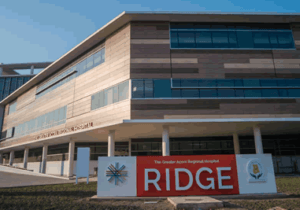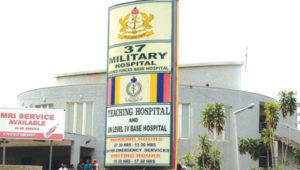Ghana: Are we serious about bridging our health disparity gap?
 The late Alvin Toffler one of the renowned futurists of the twentieth century had this view of how society treated the youth. “The secret message communicated to most young people today by the society around them is that they are not needed, that the society will run itself quite nicely until they – at some distant point in the future – will take over the reins. Yet the fact is that the society is not running itself nicely… because the rest of us need all the energy, brains, imagination and talent that young people can bring to bear down on our difficulties. For society to attempt to solve its desperate problems without the full participation of even very young people is imbecile.”
The late Alvin Toffler one of the renowned futurists of the twentieth century had this view of how society treated the youth. “The secret message communicated to most young people today by the society around them is that they are not needed, that the society will run itself quite nicely until they – at some distant point in the future – will take over the reins. Yet the fact is that the society is not running itself nicely… because the rest of us need all the energy, brains, imagination and talent that young people can bring to bear down on our difficulties. For society to attempt to solve its desperate problems without the full participation of even very young people is imbecile.”
Increasingly, I am beginning to accept that this view applies to the way we are trying to manage healthcare in Ghana. The fact remains that Ghana’s health human resources are woefully inadequate and at current training levels coupled with population growth will not be adequate within the next three decades.
This situation requires that we think innovatively about how to enhance the capabilities of our human resources in this area. To do this will mean a significant alteration in how we train new health professionals and foster collaboration with other spheres of intellect to encourage out of the box thinking and inquisitive questioning. Even in well-resourced countries, there has long been the acceptance that healthcare is increasingly becoming an area where quality and efficiency of care delivery will be underpinned by entrepreneurship and data.
Research has shown that many of the tasks health professionals routinely engage in can benefit from considerable decision support thus ensuring that consistency, efficiency and convenience underpin their activities. Unfortunately, our actions defy these new realities. A few examples that are happening on our blind side are the quiet death of the doctor’s stethoscope following the introduction of handheld ultrasound devices that allow physicians in some countries to see rather than listen to what goes on within our bodies. The development of non-invasive blood tests monitoring for diseases like malaria relying on biomarkers such as hemozoin etc.
Research has shown that many of the tasks health professionals routinely engage in can benefit from considerable decision support thus ensuring that consistency, efficiency and convenience underpin their activities.
Bringing innovation closer to home, the HealthMap algorithm, by searching tens of thousands of social networks and news media, was capable of predicting the 2014 Ebola outbreak in West Africa nine days before the World Health Organization did. Yet, five years on few if any in our sub-region have thought of exploring this as an option for disease monitoring and the issuance of early alerts. Relying instead on living in hope whilst waiting for the next epidemic to strike.
In the countries that these new approaches are occurring, those at the forefront are part of the convenience-driven generation. They are young, ambitious, free-spirited thinkers prepared to try the unthinkable and to defy the odds. They are no respecters of the status quo and are unwilling to bid their time. Also, many of them do not even come from the medical fraternity. Instead, they are often a collection of determined minds from the social sciences, software engineering, anthropology etc. who take a liken to healthcare and begin to research the large data sets that exist aided by converts within the health space.
Sadly, as this generation push the boundaries and extend the frontiers of health, our younger generation is being fed a different narrative. Encouraged to work in professional silos, they are being told: “we would get there.” In the meantime, no one tells them how we are going to get there or what we are doing to get there. Neither do they know where they are supposed to get to or where we are starting from? The irony is that whilst they imbibe this warped logic, the rest of the world is galloping away widening the health access gap between them and us. In some areas, the disparity is even not funny. Whilst autopsies are beginning to focus on genetic modifications following death, to further inform the living and encourage medical explorative inquisition, many in our country have no clue what the cause of death of their loved ones are. How on earth are they going to engage in preventative choices to avoid similar situations?
The fallacy of this mantra of “we will get there” relies on the fact that advances in healthcare have a definite destination. The truth is that there is no destination. Those leading the charge are even unsure of where all this is going to lead them to. When the pioneers of leukaemia research started, all they wanted was to stop the painful bleeding leading to death that young sufferers had to endure. Having achieved this, they move from the point of keeping them alive and in minimal pain to extending their life expectancy by a few years and eventually finding a cure that enabled them to live a fulfilled life devoid of the disease. Today others who took over have made even more advances to the point that currently the specific gene mutation that predisposes to leukaemia and many other cancers are known.
The fallacy of this mantra of “we will get there” relies on the fact that advances in healthcare have a definite destination.
This is why I believe we must start stimulating the creativity and curiosity of our younger generation in the area of health. We should open up medicine and any limited databases we may have to their curious brains and allow their fertile minds to go wild. We should allow them to question why our generation has only made limited advances in bridging the health inequality gap between us and the developed world and why we looked on whilst less-resourced countries took the fast lane to accessible and universal healthcare.
For many in our generation who unfortunately are transfixed with our analogue brains these lines of questioning may be considered intrusive and even in some instances rude. However, we should endure the inquisition and accept that the thinking that led us down this path cannot be part of the questioning that leads us to the solutions we seek.
Our country needs urgent solutions to the barriers that prevent unimpeded primary healthcare access. The regurgitation of excuses around the cost of healthcare and lack of physical infrastructures are becoming stale. So also, are the barriers around inadequate healthcare numbers. Today technology is proven that health can piggyback on the gig economy to circumvent many of these. Already in countries like the United States and Canada companies like Felix Health Inc. are using the Uber model to get primary care professionals to patients in the comfort of their homes either physically or remotely at rates cheaper than what conventional health providers charge. Similar models are emerging in some African countries.
The regurgitation of excuses around the cost of healthcare and lack of physical infrastructures are becoming stale. So also, are the barriers around inadequate healthcare numbers. Today technology is proven that health can piggyback on the gig economy to circumvent many of these. Already in countries like the United States and Canada companies like Felix Health Inc. are using the Uber model to get primary care professionals to patients in the comfort of their homes either physically or remotely at rates cheaper than what conventional health providers charge. Similar models are emerging in some African countries.
Schemes like these have led the likes of Eric Topol to predict that in the not too distant future, data and innovation might even pre-empt the need for patients to physically attend outpatient appointments and that when they do prove necessary, these will no longer be visits or appointments but informative, data-driven discussions. With a surplus of nurses in our country, coupled with an appalling outpatient per capita, the congestion and delays we experience at many outpatient departments, is this not a model we can explore? In my view, we can. All we need is the enablers that will allow our youth dare to dream.
The youth cannot wait for a yet to be identified appointment time to take over the reins. We are not doing just fine and must send that message clearly without any ambiguity. In fact, it is delusional and deceitful to continue claiming “we will get there” in a journey of which there is no clear destination based on the fact that we do not have the foggiest idea of what our blueprint plan is. Ours is a desperate situation please don’t let us kid ourselves for at this rate we are going nowhere.
By Kwame Sarpong Asiedu
